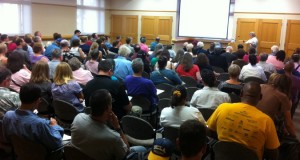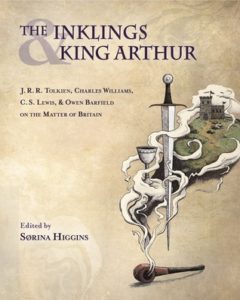 Sono da poco stati annunciati i vincitori degli Awards 2018 assegnati dalla Mythopoeic Society, durante la 49° edizione del Mythcon, la conferenza annuale della società, quest’anno svoltasi dal 20 al 23 luglio, ad Atlanta, Georgia (USA). Organizzazione statunitense nata nel 1967, la Mythopoeic Society promuove lo studio, la discussione e la condivisione della letteratura mitologica e del Fantastico, con una particolare attenzione per J. R. R. Tolkien, C. S. Lewis e Charles Williams. Le categorie dei suoi Mythopoeic Awards, che premiano le eccellenze in questo campo, sono le seguenti:
Sono da poco stati annunciati i vincitori degli Awards 2018 assegnati dalla Mythopoeic Society, durante la 49° edizione del Mythcon, la conferenza annuale della società, quest’anno svoltasi dal 20 al 23 luglio, ad Atlanta, Georgia (USA). Organizzazione statunitense nata nel 1967, la Mythopoeic Society promuove lo studio, la discussione e la condivisione della letteratura mitologica e del Fantastico, con una particolare attenzione per J. R. R. Tolkien, C. S. Lewis e Charles Williams. Le categorie dei suoi Mythopoeic Awards, che premiano le eccellenze in questo campo, sono le seguenti:
- il Mythopoeic Fantasy Award for Adult Literature, assegnato al romanzo fantasy, in più volumi o singolo, ancora a raccolte di racconti per adulti di un singolo autore pubblicati durante l’anno passato o quello precedente (se non selezionati come finalisti durante il primo anno di eleggibilità) che meglio esemplificano lo spirito degli Inklings. I libri tratti da una serie sono idonei se leggibili indipendentemente, altrimenti la serie diventa nominabile l’anno successivo alla pubblicazione del volume finale.
In questa categoria sono stati premiati libri quali i Racconti Incompiutidi J.R.R. Tolkien nel 1981, Tempesta di mezza estate di Poul Anderson, Il settimo figlio di Orson Scott Card, Il genio nell’occhio d’usignolo di Antonia S. Byatt,Stardust e I ragazzi di Anansi di Neil Gaiman, L’ombra della maledizione di Lois McMaster Bujold, Jonathan Strange e il signor Norrell di Susanna Clarke, Un cappello pieno di stelle di Terry Pratchett e la Trilogia di Bartimeus di Jonathan Stroud. Nel 2016 questo premio è stato assegnato al volume Uprooted di Naomi Novik.
- il Mythopoeic Fantasy Award for Children’s Literature destinato ai libri per i lettori più giovani (dai «giovani adulti» ai libri illustrati per lettori principianti), nella tradizione dello Hobbit e Le Cronache di Narnia (le regole d’ammissione sono le stesse del Mythopoeic Fantasy Award for Adult Literature). La questione riguardante le opere borderline fra un premio e l’altro sarà discussa con il consenso dei comitati.
Tra i vincitori di questa categoria figurano The Crown of Dalemark e Dark Lord of Derkholm di Diana Wynne Jones, Un cappello pieno di stelle di Terry Pratchett, la saga di Harry Potter di J.K. Rowling e Graceling di Kristin Cashore. Nel 2016 questo premio è stato assegnato al volume Castle Hangnail di Ursula Vernon.
- il Mythopoeic Scholarship Award in Inklings Studies, il quale premia i saggi su J.R.R. Tolkien, C.S. Lewis e Charles Williams che forniscono contributi significativi allo studio degli Inklings. Per questo riconoscimento sono validi i libri pubblicati durante gli ultimi tre anni, inclusi i passati finalisti.
Questo premio è stato assegnato a saggi quali Gli Inklings di Humphrey Carpenter, La via per la Terra di Mezzo di Thomas A. Shippey, A Question of Time: J. R. R. Tolkien’s Road to Faërie di Verlyn Flieger e The Return of the Shadow di J. R. R. Tolkien, edito dal figlio Christopher. Nel 2016 questo premio è stato assegnato al volume Charles Williams: The Third Inkling di Grevel Lindop.
- il Mythopoeic Scholarship Award in Myth and Fantasy Studies, il quale premia libri accademici su altri autori specifici della tradizione degli Inklings, o a lavori più generali nei generi del mito e della fantasia. Anche per questo premio il periodo di eleggibilità è di tre anni.
Tra gli studi premiati si annoverano libri quali Strategies of Fantasy di Brian Attebery e The Encyclopedia of Fantasy curata da John Clute and John Grant. Nel 2016 questo premio è stato assegnato al volume The Evolution of Modern Fantasy: From Antiquarianism to the Ballantine Adult Fantasy Series di Jamie Williamson.
I finalisti ed i vincitori del 2018
– Mythopoeic Fantasy Award for Adult Literature:
John Crowley, Ka: Dar Oakley in the Ruin of Ymr (Saga Press, 2017)
Alice Hoffman, The Rules of Magic (Simon and Schuster, 2017)
G. A. Kathryns, Snow City (Sycamore Sky Books, 2017)
Ellen Klages, Passing Strange (Tor.com, 2017)
Victor LaValle, The Changeling (Spiegel and Grau, 2017)
VINCITORE: John Crowley, Ka: Dar Oakley in the Ruin of Ymr
– Mythopoeic Fantasy Award for Children’s Literature:
Cassie Beasley, Tumble and Blue (Dial Books, 2017)
Stephanie Burgis, The Dragon with the Chocolate Heart (Bloomsbury USA Childrens, 2017)
Nidhi Chanani, Pashmina (First Second, 2017)
A. F. Harrold, The Song from Somewhere Else (Bloomsbury USA Childrens, 2017)
Garth Nix, Frogkisser (Scholastic Press, 2017)
VINCITORE: Garth Nix, Frogkisser
– Mythopoeic Scholarship Award in Inklings Studies:
Jane Chance, Tolkien, Self and other: This Queer Creature (Palgrave Macmillan, 2016)
Lisa Coutras, Tolkien’s Theology of Beauty: Majesty, Splendor, and Transcendence in Middle-earth (Palgrave Macmillan, 2016)
Verlyn Flieger, There Would Always Be a Fairy Tale: More Essays on Tolkien (Kent State University Press, 2017, tra le proposte vagliate anche per il Tolkien Society Awards 2018 come miglior libro)
Sørina Higgins, The Inklings and King Arthur: J. R. R. Tolkien, Charles Williams, C. S. Lewis, and Owen Barfield on the Matter of Britain (Apocryphile Press, 2017)
Christopher Tolkien, ed., Beren and Lúthien (Houghton Mifflin Harcourt, 2017)
VINCITORE: Sørina Higgins, The Inklings and King Arthur: J. R. R. Tolkien, Charles Williams, C. S. Lewis, and Owen Barfield on the Matter of Britain
– Mythopoeic Scholarship Award in Myth and Fantasy Studies:
Aisling Byrne, Otherworlds: Fantasy and History in Medieval Literature (Oxford Univ. Press, 2016)
Dimitra Fimi, Celtic Myth in Contemporary Children’s Fantasy: Idealization, Identity, Ideology (Palgrave MacMillan, 2017)
Levy, Michael and Farah Mendlesohn, Children’s Fantasy Literature: An Introduction (Cambridge Univ. Press, 2016)
Elizabeth M. Sanders, Genres of Doubt: Science Fiction, Fantasy and the Victorian Crisis of Faith (McFarland, 2017)
Mark J.P. Wolf,ì, ed., The Routledge Companion to Imaginary Worlds (Routledge, 2017)
VINCITORE: Levy, Michael and Farah Mendlesohn, Children’s Fantasy Literature: An Introduction
Re Artù secondo gli Inklings
 Per chi desiderasse approfondire i contenuti della raccolta di saggi che quest’anno si è aggiudicata la vittoria nella categoria Inklings Studies, The Inklings and King Arthur: J. R. R. Tolkien, Charles Williams, C. S. Lewis, and Owen Barfield on the Matter of Britain curata da Sørina Higgins, proponiamo l’indice del volume:
Per chi desiderasse approfondire i contenuti della raccolta di saggi che quest’anno si è aggiudicata la vittoria nella categoria Inklings Studies, The Inklings and King Arthur: J. R. R. Tolkien, Charles Williams, C. S. Lewis, and Owen Barfield on the Matter of Britain curata da Sørina Higgins, proponiamo l’indice del volume:
- Introduction—Present and Past: The Inklings and King Arthur, Sørina Higgins
- 1. The Matter of Logres: Arthuriana and the Inklings, Sørina Higgins
- 2. Medieval Arthurian Sources for the Inklings: An Overview. Holly Ordway.
3. Mixed Metaphors and Hyperlinked Worlds: A Study of Intertextuality in C. S. Lewis’s Ransom Cycle, Brenton D. G. Dickieson
- 4. Houses of Healing: The Idea of Avalon in Inklings Fiction and Poetry, Charles A. Huttar
- 5. Shape and Direction: Human Consciousness in the Inklings’ Mythological Geographies, Christopher Gaertner
- 6. From Myth to History and Back Again: Inklings Arthuriana in Historical Context, Yannick Imbert
- 7. “All Men Live by Tales”: Chesterton’s Arthurian Poems, J. Cameron Moore
- 8. The Elegiac Fantasy of Past Christendom in J. R. R. Tolkien’s The Fall of Arthur, Cory Grewell
- 9. Spiritual Quest in a Scientific Age, Jason Jewell e Chris Butynskyi
- 10. The Stripped Banner: Reading The Fall of Arthur as a Post-World War I Text, Taylor Driggers
- 11. “Lilacs Out of the Dead Land”: Narnia, The Waste Land, and the World Wars, Jon Hooper
- 12. “What Does the Line along the Rivers Define?”: Charles Williams’s Arthuriad and the Rhetoric of Empire, Benjamin D. Utter
- 13. “Fair as Fay-woman and Fell-minded”: Tolkien’s Guinever. Alyssa House-Thomas
14. Beatrice and Byzantium: Sex and the City in the Arthurian Works of Charles Williams, Andrew Rasmussen
- 15. Those Kings of Lewis’s Logres: Arthurian Figures as Lewisian Genders in That Hideous Strength, Benjamin Shogren
- 16. “Servant of All”: Arthurian Peregrinations in George MacDonald Kirstin Jeffrey Johnson
- 17. Camelot Incarnate: Arthurian Vision in the Early Plays of Charles Williams, Bradley Wells
- 18. “Any Chalice of Consecrated Wine”: The Significance of the Holy Grail in Charles Williams’s War in Heaven, Suzanne Bray
- 19. The Acts of Unity: The Eucharistic Theology of Charles Williams’s Arthurian Poetry, Andrew C. Stout
- Conclusion—Once and Future: The Inklings, Arthur, and Prophetic Insight, Malcolm Guite.
Professoressa di inglese, scrittrice, editor e studiosa degli Inklings, Sørina Higgins attualmente è la direttrice del Dipartimento di Letteratura e Lingua della Signum University del Mythgard Institute.
Higgins gestisce inoltre un blog dedicato alle opere di Charles Williams, The Oddest Inkling. Nel 2014 ha curato un’edizione del dramma The Chapel of the Thorn (La Cappella della Spina) di Williams (Apocryphile Press).
ARTICOLI PRECEDENTI:
– Leggi l’articolo I vincitori dei Tolkien Society Awards 2018
– Leggi l’articolo Annunciati i finalisti dei Mythopoeic Awards 2017
– Leggi l’articolo Annunciati i finalisti alla Mythopoeic Society 2016
– Leggi l’articolo Mythopoeic, i finalisti: c’è anche Umberto Eco
– Leggi l’articolo Premio a Verlyn Flieger: diario della Mythcon 44
– Leggi l’articolo I finalisti alla Mythopoeic Society
– Leggi l’articolo There Would Always Be a Fairy Tale, recensione
– Leggi l’articolo La nuova raccolta di saggi di Verlyn Flieger
– Leggi l’articolo Gli Inklings e re Artù: ecco il Call for papers
LINK ESTERNI:
– Vai al sito della Mythopoeic Society
– Vai al blog di Sørina Higgins
– Vai al sito della Signum University
– Vai al blog The Oddest Inkling
.

